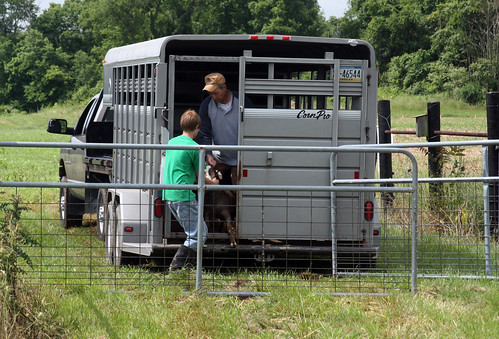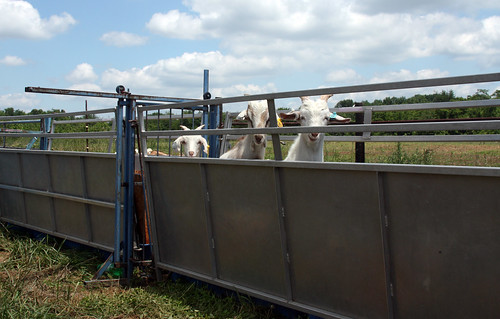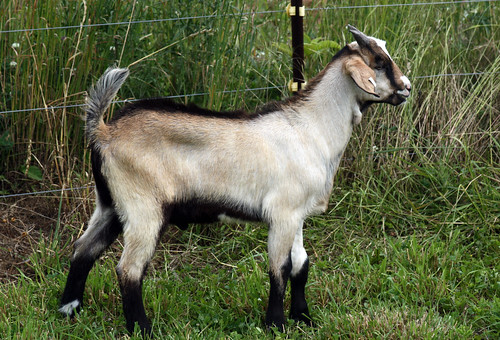The bucks were consigned by 17 breeders from 11 states: Delaware, 1; Kansas, 1; Illinois, 2; Maryland, 3; Missouri, 1; Ohio, 1; Oklahoma, 2; Pennsylvania, 2; Tennessee, 1; Virginia, 2; and West Virginia, 1. They include 46 New Zealand, purebred, and percentage Kiko; 5 Boer x Kiko crossbred; 6 fullblood and percentage Boer, 2 Composite Tennessee Mountain Meat Goat, and 1 Myotonic.
 Upon arrival to the test site, the goats were required to stand in a foot bath (containing zinc sulfate) for ten minutes. They were weighed and ear tagged. FAMACHA© and body condition scores were determined. The goats were dewormed with Cydectin® 1% injectable (1 ml/100) and Prohibit™ drench (3 ml/50 lbs.). In last year’s test, this dual-treatment reduced beginning fecal egg counts by 95 percent.
Upon arrival to the test site, the goats were required to stand in a foot bath (containing zinc sulfate) for ten minutes. They were weighed and ear tagged. FAMACHA© and body condition scores were determined. The goats were dewormed with Cydectin® 1% injectable (1 ml/100) and Prohibit™ drench (3 ml/50 lbs.). In last year’s test, this dual-treatment reduced beginning fecal egg counts by 95 percent.FAMACHA© scores ranged from 1 to 4 and averaged 1.8. Only one goat would have required deworming based on FAMACHA© scores. The purpose of deworming all of the goats with anthelmintics from different chemical classes is to make sure all the goats begin the test “free” from nematode parasites. Cydectin® and levamisole are used because resistance tends to be less for these drugs.
 During the test when a goat requires anthelmintic treatment, Cydectin© is usually given. Towards the end of the test, levamisole is usually the drug of choice due to its shorter withdrawal period. Levamisole is currently unavailable for purchase. Fortunately, the test had purchased several packets of the drench powder last year.
During the test when a goat requires anthelmintic treatment, Cydectin© is usually given. Towards the end of the test, levamisole is usually the drug of choice due to its shorter withdrawal period. Levamisole is currently unavailable for purchase. Fortunately, the test had purchased several packets of the drench powder last year.Body condition scoring provides another indication for the need for deworming. It is accessed by feeling for fat and muscle over the backbone, ribs, and loin edge. Scores range from 1 to 5, with 1 being emaciated, 3 being average, and 5 being obese. Body condition scores ranged from 2 to 3 and averaged 2.7.
Fecal samples were collected from the rectum of each goat. Individual fecal egg counts (eggs per gram/epg) will be determined by Dr. Dahlia Jackson’s lab at Delaware State University. The pooled samples will be sent to Dr. Ray Kaplan’s lab at the University of Georgia for fecal coproculture (larvae ID).
 The bucks are smaller this year, averaging 46.9 lbs., several pounds lighter than last year. Twenty-five percent of the bucks weighed less than 40 lbs. Only 5 weighed more than 65 lbs. The official starting weights will be determined on June 18 after a 12-day adjustment period to give the goats a chance to adapt to their new environment, diet, and pasture mates.
The bucks are smaller this year, averaging 46.9 lbs., several pounds lighter than last year. Twenty-five percent of the bucks weighed less than 40 lbs. Only 5 weighed more than 65 lbs. The official starting weights will be determined on June 18 after a 12-day adjustment period to give the goats a chance to adapt to their new environment, diet, and pasture mates.Early in the test, the goats will graze pastures containing orchardgrass and/or MaxQ™ tall fescue. The 2 acre field of chicory was recently mowed, due to plant maturity. The two acre field of pearl millet was recently planted, as was an acre of sericea lespedeza.











